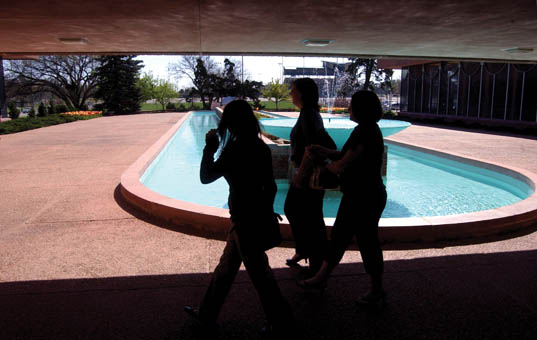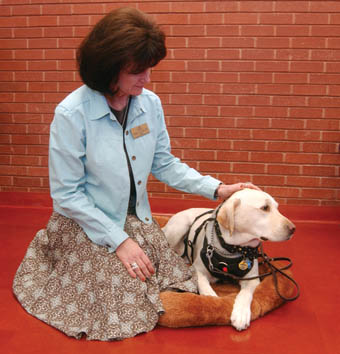
Ask College of Education Dean Sharon Iorio what makes WSU’s College of Education special, and one adjective keeps coming up: innovative.
And the noun form of the word is an operative part of the college’s tag line: “Academic Innovation in Living and Learning.” Whether it’s being housed in a building with a world-class design or offering atypical programs, innovation is a thread that weaves through the entire college — its faculty and staff, its students and alumni. “We are constantly changing and evolving,” says Iorio, who has served as dean since July 1, 2007. “I was put at ease immediately by the faculty. It’s been a rewarding experience and so many good things have happened.”
One good thing — and a measure of the college’s academic standing — is the PRAXIS pass rate of its graduates. Each year, grads seeking to be licensed to teach in Kansas public schools must pass a nationally normed exam, PRAXIS. In 2006-07, 122 WSU recent grads and other grads seeking additional licensure took the exam. The WSU total pass rate was 94 percent, exceeding the statewide pass rate of 93 percent. The WSU pass rate is the first quartile, or the highest rank of institutions statewide that prepare students for licensure.
The Corbin Center
The college is housed in the Corbin Education Center, a unique Frank Lloyd Wright-designed structure that runs parallel to 21st Street on the north side of campus. A complete renovation of the 40,000-square-foot building was recently completed, which included the removal of asbestos material, installation of new and more efficient climate-control systems, floor replacements and leak repairs.
The 44-year-old complex, which is designated as a protected historic site, is finished in a pattern of terra cotta, black and turquoise. The structure’s design is of two buildings joined by an esplanade. Two 60-foot “light needles” grace the center section of the two buildings.
Named in honor of Harry Corbin, a former president of Wichita University, the complex was dedicated in 1964.
To celebrate the renovation of the Corbin Education Center and also acquaint people with the college and its many programs, education faculty, staff and students held an open house April 19.

WSU’s Therapy Dog
When assistant professor of counseling, education and school psychology Nikki S. Currie comes to work, she’s often accompanied by her four-legged assistant, Keanu, a 4-year-old yellow lab.
This is the first time WSU has used a dog in counseling and counseling education, Currie says, although such trained canines have been used for years in other related endeavors.
A therapy dog is one of four types of trained assistance dogs and as such provides comfort and companionship to those in need. Therapy dogs can be used as an incentive or motivator, provide social stimulation and offer a focal point for individuals and groups, Currie says.
Specially trained dogs such as Keanu also can model cooperation to others and help fulfill the “universal need” for touch, Currie says. Keanu has become such an integral part of WSU’s counseling program that he even has his own posted office hours. While Keanu is especially effective at calming angry children, Currie notes that morale, in general, “improves when he’s there.”
At the college’s open house, Keanu was one of many attractions — offering a friendly wag and big smile to visitors.
A Living Lab
Wichita State exercise science students can get hands-on experience they can use later in their careers by working with seniors at the Center for Physical Activity and Aging. The center’s mission is to examine relationships between exercise and aging through research, education and service. There’s nothing else like it in the state and few like it in the country, says Michael Rogers, associate professor of kinesiology and sports studies and the center’s research director.
The center holds a number of classes for seniors along with physical fitness testing, such as bone-density testing. It’s a two-way process that benefits both the young and old: Students learn about how to provide valuable services and the seniors learn how to maintain a high quality of life. It’s a “living laboratory” in which the complex relationship between aging and physical activity is explored, say center officials. The center also includes special workshops and community outreach programs that assist not only seniors, but those who work and live with them to help them stay as fit as possible in a variety of ways — including emotionally and socially — for as long as possible.
With a growing aging population, the center and its programs are becoming more important and pertinent with each passing each year, Rogers says.





